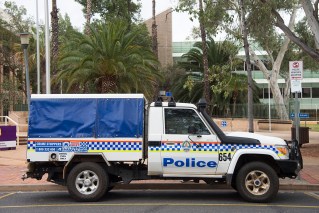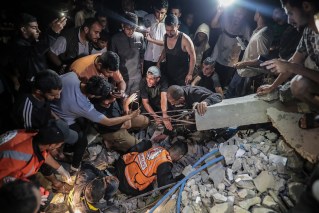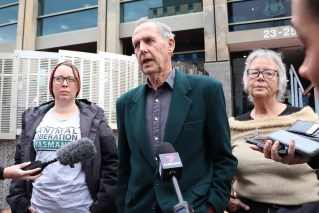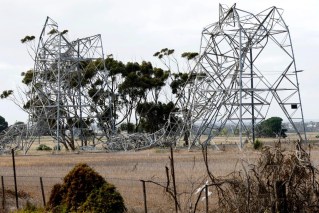Beirut officials under house arrest amid blame game over chemical storage

Port officials have been placed under house arrest and a two-week state of emergency declared in Beirut as the search for survivors continues after the massive explosion that has killed at least 135 people.
More than 5000 people were injured in the explosion at Beirut port – with many more still missing – and up to 300,000 were left without homes fit to live in after the huge blast ripped through the Lebanese capital.
The devastating explosion appeared to have been triggered by a fire that ignited 2750 tonnes of ammonium nitrate – used in fertilisers and bombs – which had been stored for six years in the port.
The Lebanese army will oversee the house arrest of port officials who were involved in storing or guarding the explosive material since 2014.
Details of how and why the dangerous stockpile was held on the port for many years are continuing to emerge.
Early investigation reports suggest “nothing was done” to remove or dispose of the chemical which had been seized from a ship despite the issue coming before several committees and judges.
Reuters cited a source claiming the ammonium nitrate was last inspected six months ago. One worker warned it could “blow up all of Beirut” if not removed.

Many Beirut residents can no longer live in their damaged homes. Photo: Getty
A report from 2015 stated that the ship Rhosus, sailing under a Moldovan flag, docked in Beirut in September 2013 with technical problems en route from Georgia to Mozambique with 2750 tonnes of ammonium nitrate.
Upon inspection, the vessel was forbidden from sailing and then afterwards abandoned by its owners, according to the report by Shiparrested.com, an industry network dealing with legal cases.
“Owing to the risks associated with retaining the ammonium nitrate on board the vessel, the port authorities discharged the cargo onto the port’s warehouses,” it added.
Blast aftermath
About half of Beirut has been damaged by the explosion, the city’s governor Marwan Abboud said. He estimated the total cost to the economy would exceed $3 billion.
The death toll is expected to rise as rescuers continue the search for victims who remain trapped under rubble.
An Instagram account set up for residents to share pictures of missing relatives has amassed nearly 100,000 followers.
Tweet from @carolecadwalla
Hospitals have been inundated with patients so much so that in Gemmayze district, medical teams were forced to triage patients in a car park.
Many blamed the explosion on the country’s long-entrenched political class, saying it was the result of decades of corruption and neglect.
“They are so irresponsible that they ended up destroying Beirut,” said Sana, a retired schoolteacher. “I worked for 40 years to make this home and they destroyed it for me in less than a minute.”
“Beirut is gone” said Mohammed Saad, an out-of-town driver making his way through the mangled streets.
Tweet from @Abihabib
“We don’t deserve this,” said Riwa Baltagi, a 23-year-old who was helping friends retrieve valuables from their demolished homes.
Some of the worst damage was in the leafy neighbourhoods of Mar Mikhael and Gemayzeh, where the blast damaged some of the few historic buildings that survived the 1975-1990 civil war.
Many of those killed were port and custom employees, people working in the area or those driving nearby during the Tuesday evening rush hour.
Tweet from @RexChapman
The Red Cross was coordinating with the Health Ministry to set up morgues as hospitals were overwhelmed.
Offers of international support have poured in. Gulf Arab states sent planes with medical equipment and other supplies. Iran offered food and a field hospital, ISNA news agency said.
The United States, Britain, France and other Western nations, which have been demanding political and economic change in Lebanon, also offered help. Germany, the Netherlands and Cyprus offered specialised search and rescue teams.
For many it was a reminder of the 1975 to 1990 civil war that tore the nation apart and destroyed swathes of Beirut, much of which had been rebuilt.

Beirut port before and after the blast. Photo: AAP
Beirut driver Abou Khaled said ministers “are the first that should be held accountable for this disaster. They committed a crime against the people of this nation with their negligence.”
The port district was left a tangled wreck, disabling the nation’s main route for imports needed to feed a nation of more than 6 million people.
Senior clinical lecturer in medicine at the Australian National University Dr David Caldicott has modelled Ammonium nitrate and said the death toll would likely rise.
“Our research group computer modelled the possible effects of merely a 5 tonne ammonium nitrate/fuel oil (ANFO) device on the Adelaide CBD in the mid-‘00s, and the results were several 100 dead and 1000s injured.
Tweet from @jenanmoussa
Lebanon has already been struggling to house and feed refugees fleeing conflict in neighbouring Syria and has no trade or other ties with its only other neighbour Israel.
“The blast blew me metres away. I was in a daze and was all covered in blood. It brought back the vision of another explosion I witnessed against the US embassy in 1983,” said Huda Baroudi, a Beirut designer.
Prime Minister Hassan Diab promised there would be accountability for the blast at the “dangerous warehouse”, adding “those responsible will pay the price”.
The blast came three days before a UN-backed court was set to deliver a verdict in the trial of four suspects from Iranian-backed Shi’ite Muslim group Hezbollah over a 2005 bombing that killed former Prime Minister Rafik al-Hariri and 21 others.
The verdict has been delayed untill August 18, “out of respect for the countless victims of the devastating explosion that shook Beirut on 4 August, and the three-days of public mourning in Lebanon,” the court’s registry said in a statement.
Al-Hariri was killed by a truck bomb on another part of the Beirut waterfront, about 2 km from the port.
-with AAP








